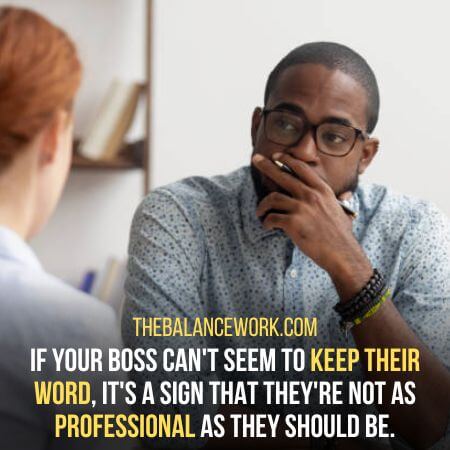Signs of an unprofessional boss can not stay hidden for long. Because amateur behavior will always be there to give them away.
A boss has to be the epitome of professionalism if they want to earn the respect of their subordinates. Unfortunately, not all bosses are cut out for the job.
Signs Of An Unprofessional Boss – Top 14
Some bosses may try to act professional, but their true colors will always shine through eventually.
Here are some signs that you may be working for an unprofessional boss:
1. Unprofessional Boss Break Promises Constantly:
A professional boss will always keep their word. If they say they’re going to do something, they’ll make sure it gets done.
An unprofessional boss, on the other hand, will often break promises. They may say they’ll give you a raise or promotion but then never follow through.

Or, they may make promises to clients or customers that they can’t keep.
They might say, “We’ll have your order delivered in two weeks,” but then it takes six weeks to arrive.
Or “We’ll start the project next week,” but then it gets pushed back again and again. This will reflect poorly on you and the rest of the team.
Promises are to fulfill, not break. If your boss can’t seem to keep their word, it’s a sign that they’re not as professional as they should be.
This can be incredibly frustrating for employees whose boss constantly lets them down.
2. Inconsistent With Expectations:
A professional boss will have clear expectations for their employees. They will communicate these expectations and make sure everyone is on the same page.
An unprofessional boss, however, will often be inconsistent with their expectations.
They may tell you to do one thing one day and then criticize you for doing it the next day.
For instance, they may tell you to be more assertive with clients but then get mad at you for being too pushy.
Or, they may tell you to take more initiative. But then get upset when you decide without consulting them first.
This inconsistency can be confusing and annoying for employees. It’s hard to please an unprofessional boss when they can’t even decide what they want.
Another trait is that they may set different standards for different employees. This can create a feeling of unfairness and resentment among the team.
It can make it difficult for employees to know the boss expects of them. Because if the boss isn’t consistent, how can the employees be consistent?
3. Emotionally Immature:
Professionalism is not just about behaving in a certain way. It’s also about having a certain mindset.
A professional boss is emotionally mature. They can control their emotions and react to situations calmly and rationally.
An unprofessional boss, on the other hand, is often emotionally immature.
They may let their emotions get the best of them and make impulsive decisions.
For instance, they may yell at an employee for making a mistake, even if it was honest. Or, they may throw a tantrum when things don’t go their way.
Or, they may make drastic changes to the company without consulting anyone first.
This impulsiveness can be disastrous for a business. It can create a hostile environment and lead to high turnover rates.
It can also damage relationships with clients and customers. Nobody wants to do business with a company run by an emotionally immature boss.
They might also gossip about other employees or spread rumors. This type of behavior is very childish and unbecoming of a boss.
4. Unprofessional Boss is Poor Communicator:
Communication is vital in any business relationship. Professional bosses understand the importance of clear and concise communication.
They keep their employees in the loop and let them know what they expect of them.
On the other hand, an unprofessional boss is often a poor communicator. They may not give clear instructions or may withhold important information.

For instance, they may not tell their employees about a change in policy until it’s too late.
Or, they may give conflicting instructions. It leave employees confused about what they’re supposed to do.
This lack of communication can lead to a lot of problems. Employees may make mistakes because they don’t know what’s expected.
Or, they may become frustrated and resentful because they feel like they’re in the dark. Either way, it’s not a good situation for anyone involved.
Poor communication can also damage relationships with clients and customers. If the boss isn’t communicating well, then the rest of the team won’t be able to either.
And if everyone isn’t on the same page, it can lead to misunderstandings and conflict.
5. Unprofessional In Appearance:
A professional boss understands that first impressions are essential. They take care to dress appropriately and present themselves in a positive light.
But an unprofessional boss may not see the importance of their appearance. They may show up to work in wrinkled clothes or with unkempt hair.
Or, they may wear inappropriate clothing that is too casual or revealing.
This unprofessionalism can be off-putting to clients and customers. It can make them question the competency of the boss and the company as a whole.
It can also make employees feel uncomfortable. After all, if the boss doesn’t care about their appearance, why should they?
And that leads to a general feeling of disrespect. Because when someone doesn’t respect themselves, it’s hard for them to respect others.
6. Unprofessional Bosses are Disorganized:
A professional boss has everything organized and efficient. They have a system in place for everything, and they stick to it.
This helps to ensure that the company is running smoothly. And that everyone knows what they’re supposed to be doing.
An unprofessional boss but is often disorganized. They may not have a system in place for anything.
For instance, they may not have a set process for hiring new employees. Or, they may not have a system for dealing with customer complaints.
This lack of organization can lead to a lot of problems. Employees may feel like they’re constantly playing catch-up.
Or, your boss may start a project without finishing it. Incomplete projects can be a breeding ground for problems.
No one knows what they’re supposed to be doing. And as a result, things fall through the cracks.
You may even lose revenue because your boss was too disorganized to finish a project on time.
7. Inappropriate Behaviour:
A professional boss behaves in a way that is appropriate for the workplace. They are polite and respectful to their employees and maintain a positive attitude.
But an unprofessional boss may not have the same standards. They may berate their employees in front of others or speak to them demeaningly.
They may also gossip about other employees. Or engage in different types of negative behavior. This type of behavior creates a toxic work environment.
It can make employees feel like they’re not valued or respected. And it can lead to a high turnover rate.
Moreover, unprofessional behavior can damage the company’s reputation.
If word gets out that the boss is misbehaving, it can make it hard to attract new employees or customers.
8 Not a Good Listener:
A professional boss is open to hearing new ideas and suggestions. They understand that their employees may have valuable insights. And they can use them to improve the company.
But an unprofessional boss may not be as willing to listen. They may see their employees as subordinate and not worth listening to.
Or, they may be too set in their ways to change. This lack of open-mindedness can stunt the growth of the company.

New ideas and suggestions may never get their way because the boss wasn’t willing to listen. And that can make employees feel like their opinions don’t matter.
The company may also miss out on opportunities because the boss wasn’t willing to listen to new ideas. In the end, it costs the company both money and goodwill.
9 Don’t Take Responsibility For Their Actions:
Not being accountable for your actions is a surefire sign of an unprofessional boss.
A professional boss takes responsibility for their actions, even when things go wrong.
But an unprofessional boss may try to blame others when things go wrong.
They may shift the blame onto their employees or make excuses for their own mistakes.
The blame game only leads to a feeling of resentment among employees. No one wants to work for someone who is always quick to point the finger.
It also creates an environment of distrust. Employees may wonder if their boss is looking out for them.
And that can make it hard to get work done. This type of behavior also makes employees feel like they’re being unfairly scapegoated.
It can also damage the employer-employee relationship. It’s hard to respect someone who doesn’t take responsibility for their actions.
Moreover, this type of behavior can have profound legal implications.
If the boss makes an employee responsible for something that wasn’t their fault, they could sue the company.
10 Unprofessional Boss Don’t Care About Employees:
A professional boss cares about their employees. They want to see their employees succeed both professionally and personally.
But an unprofessional boss may not care about their employees. They may see their employees as nothing more than a means to an end.
This lack of concern can lead to all sorts of problems. For one, it can create a toxic work environment.
If the boss doesn’t care about their employees, they’re not going to be very motivated to do their best work.
And that can harm the company’s bottom line. Moreover, this type of behavior can lead to high turnover rates.
Employees who feel like they’re not valued are more likely to look for new jobs. And that costs the company time and money.
11 They Are Always Late:
A professional boss is punctual. They understand that their employees have lives outside of work, and they try to respect that.

But an unprofessional boss may not be as considerate. They may show up late for meetings or take long lunches.
This behavior sends the message that the boss doesn’t care about their employees’ time.
And that can make employees feel undervalued. Moreover, this type of behavior can have a negative impact on productivity.
If the boss is always late, it sets a bad example for the rest of the company. Employees may start to think that it’s okay for them to be late.
And that can lead to a lot of wasted time. In the end, being a professional boss isn’t just about knowing the right things to do.
It’s also about doing those things. After all, actions speak louder than words. If you want to be a professional boss, make sure you lead by example.
12. Unprofessional Bosses Are Rude:
Unprofessional bosses are often rude to their employees. This can include yelling, swearing, or making derogatory comments.
Moreover, unprofessional bosses may also belittle their employees in front of others.
They have no boundaries and will often say whatever is on their mind, regardless of how hurtful it may be.
Sometimes, this behavior is a result of their own insecurities. They feel the need to put others down in order to make themselves feel better.
However, this is not an acceptable way to treat employees. It creates a hostile work environment and can lead to high turnover rates.
13. They Play Favorites:
Unprofessional bosses often play favorites with their employees. When this happens, they give certain employees special treatment.
They may give them more responsibility, better assignments, or even bigger raises.
On the other hand, they may also give other employees the cold shoulder.

Not only is this unfair, but it can also create a lot of tension in the workplace.
This can lead to feelings of jealousy and resentment. It also creates an environment where employees are afraid to speak up.
Employees who feel like they are being treated unfair are less likely to be productive. They may even start looking for new jobs.
14. They Make Threats:
A professional boss understands that there are certain consequences for not meeting deadlines.
But an unprofessional bosses often make threats to their employees. They may threaten to fire them, demote them, or give them undesirable assignments.
Or, they may threaten to withhold raises or benefits. This type of behavior is completely unacceptable.
Bosses are not allowed to make threats like this. Doing so creates a hostile work environment and can lead to legal trouble.
Moreover, it shows a complete lack of respect for employees. Respect is a two-way street, and unprofessional bosses often fail to see that.
Conclusion:
These are some of the signs of an unprofessional boss. If you see any of these signs in your boss, it may be time to start looking for a new job.
Working for an unprofessional boss can be frustrating, toxic, and even dangerous. So if you don’t feel like they are treating you farily, it’s essential to speak up.
And if your boss doesn’t listen, it may be time to move on.
Last Updated on 5 hours by Shahzaib Arshad
- Why Does My Boss Wink At Me? 6 Potential Reasons - October 5, 2023
- Is It Legal For Your Employer To Call Your Doctor? No, But… - October 4, 2023
- 12 Ways To Deal With A Low IQ Person - September 22, 2023